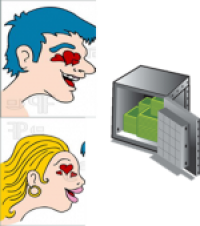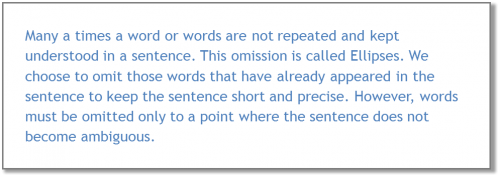HOW FAR ELLIPSIS IS PERMISSIBLE IN COMPARISONELLIPSES IN COMPARISON – USE OF HELPING VERBS
Hi Folks,
Before we get started with the grammatical nuances of this topic – how far we can keep the words understood – let’s do a little exercise here. Which of these sentences are correct?
1. John has more love for money than his wife.
2. John cooks better pizza than his wife.
3. John is scared of ghosts more than his wife.

Pretty simple sentences, right? So you got them all right? Well, let me tell you that only the second here is correct. Read on to know why.
AMBIGUOUS COMPARISONAll the three above mentioned sentences present comparison. The structure of all the three are also the same. But still, only the second sentence is correct. This is so because only the second sentence presents clear comparison. The first and third sentences present ambiguous comparison.
Let’s first study the first sentence:
SIMPLE SENTENCE 1:John has more love for money than his wife.
We can actually infer two meanings from this sentence:
Meaning 1: John loves both money and his wife. But he loves money more. So
entities compared here are
“money” and
“his wife”.
 Meaning 2:
Meaning 2: Both and John and his wife love money. But between the two, John loves it more. So the entities compared here
“John” and
“his wife”.
 Why Ambiguity
Why Ambiguity – This sentence is ambiguous because both the comparisons are possible. While
“money” and
“his wife” are comparable (John is so materialistic, you may say

.) in the first inferred meaning,
“John” and
“his wife” are also totally comparable. Both these possible comparisons make this sentence ambiguous and incorrect.
The same is the case with the third sentence. Let’s see how:
SIMPLE SENTENCE 3: John is scared of ghosts more than his wife.
Again, we can infer two meanings here:
Meaning 1: John is scared of both ghosts and his wife. But he is more scared of ghosts. So
entities compared here are
“ghosts” and
“his wife”.

 Meaning 2
Meaning 2: Both and John and his wife are scared of ghosts. But between the two, John is more scared of ghosts. (Coward John

) So the
entities compared here “John” and
“his wife”.
Why Ambiguity – The reason is the same as the first sentence. Both the comparisons are possible and that makes the sentence ambiguous and incorrect.
However this ambiguity does not touch the second sentence. This is how:
SIMPLE SENTENCE 2: John cooks better pizza than his wife.
 Meaning
Meaning: There is no question of two comparisons here. We just cannot say that John cooks better pizza than he cooks his wife (unless he is a cannibal

). This comparison is just not logical. Hence we have just one comparison here. John and his wife both cook pizza. But John is better in doing that.
So we see that despite same structures, while the second sentence is absolutely clear in its meaning and comparison, the other two suffers from ambiguity problem.
 BLAME IT ON ELLIPSES
BLAME IT ON ELLIPSESThe reason why there is ambiguity in the first and the third sentence is that there are some words missing from both these sentences and these omissions have led to ambiguity in the meaning.
In the two ambiguous sentences, the words have been omitted to the extent to make the sentence ambiguous. Let’s see what went wrong in the two ambiguous sentences:
SIMPLE SENTENCE 1: John loves money more than his wife.
The comparison in this sentence is ambiguous as it may have two meanings. So if we want to communicate
Meaning 1, where the intended comparison is between
“money” and
“his wife”, then the sentence must be written this way:
• John has more love for money than
for his wife.
This sentence clarifies the intended comparison. The comparison has been clarified by the insertion of the preposition “for”. Notice that this preposition already appears in the sentence before “for”, but it is imperative to repeat it before “his wife” also to clarify the intended comparison. The omission of preposition led to the ambiguity in the sentence even if “for” already exists in the sentence.
If we want to communicate
Meaning 2, where the intended comparison is between
“John” and
“his wife”, then the sentence must be written this way:
• John has more love for money than
has his wife.
In this sentence also, we see that even if “has” is already present once, we need to repeat “has” again before “his wife” to clarify the ambiguity in comparison.
Now let’s see how we can correct the other sentence.
SIMPLE SENTENCE 3: John is scared of ghosts more than his wife.
Same as the first sentence, we want to convey
Meaning 1, where the intended comparison is between
“ghosts” and
“his wife”, then the sentence must be written this way:
• John is scared of ghosts more than
of his wife.
Insertion of omitted “of” before “his wife” is all we need to clarify the intended comparison in this sentence even if “of” is already present in the sentence. Removal of this word leads to an ambiguous incorrect sentence.
If we want to communicate
Meaning 2, where the intended comparison is between
“John” and
“his wife”, then the sentence must be written this way:
• John is scared of ghosts more than
is his wife.
Repeating the helping verb “is” before “his wife” makes the intended comparison clear. Even if this word is already present in the sentence, we saw how removal of this word led to ambiguous sentence.
TAKE AWAY OFFICIAL EXAMPLE#1
OFFICIAL EXAMPLE#1 Let’s see how we can apply this knowledge to solve official questions that test this concept. Here comes the first official question
OFFICIAL EXAMPLE: Let us take a look at this
OGV2#103 question:
Inuits of the Bering Sea were
in isolation from contact with Europeans longer than Aleuts or Inuits of the North Pacific and northern Alaska.
A. in isolation from contact with Europeans longer than
B. isolated from contact with Europeans longer than
C. in isolation from contact with Europeans longer than were
D. isolated from contact with Europeans longer than were
E. in isolation and without contacts with Europeans longer than
Let’s first understand what this sentence is conveying.
Meaning Analysis:
• Sentence presents comparison.
• It says that Inuits of Bering Sea were isolated from contact longer than Aleuts or Inuits of the North Pacific and northern Alaska.
Error Analysis:
1. This sentence resembles the core structure of the three sentences that we saw right in the beginning of the article. The way this sentence is written, we can infer two meanings:
Meaning 1: Inuits of the Bering sea were isolated from both Europeans and Inuits of the NP and NA. But they were in isolation for longer with Europeans. So the entity compared here are
“Europeans” and
“Inuits of the NP and NA”.
Meaning 2: Both kinds of Inuits were isolated from Europeans. But Inuits of the Bering Sea were in isolation for longer. So the entity compared here are
“Inuits of the Bering Sea” and
“the Inuits of the NP and NA”.
Both these comparisons are possible because all the three entities
“Inuits of the Bering Sea”,
“the Inuits of the NP and NA” and,
“Europeans”. So at this point it is not possible to say what the intended comparison is.
• What we do know now is that if the intended comparison is between
“Europeans” and
“Inuits of the NP and NA”, then we need the preposition
“with” before
“Inuits of the NP and NA”. This will clarify the comparison.
• If the intended comparison is between
“Inuits of the Bering Sea” and
“the Inuits of the NP and NA”, then we need the helping verb
“were” before
“Inuits of the NP and NA”.
2. Another error in this sentence is the idiom error. Phrase “in isolation from contact” is not grammatical.
So let’s now do the
PoE to see which comparison is intended.
A. in isolation from contact with Europeans longer than:
Incorrect for the reason stated above.
B. isolated from contact with Europeans longer than:
Incorrect for repeating the same ambiguous comparison error as in choice A, although the idiom error has been corrected.
C. in isolation from contact with Europeans longer than were:
Incorrect for incorrect idiom. However, notice that the comparison is clear here. Insertion of the helping verb “were” makes it clear that the choice intends to compare Inuits of the Bering Sea” and “the Inuits of the NP and NA”.
D. isolated from contact with Europeans longer than were:
Correct. The helping verb “were” clarifies the comparison.
E. in isolation and without contacts with Europeans longer than:
Incorrect for repeating the same ambiguous comparison error as in choice A. Also, this choice changes the meaning by saying that Inuits were “in isolation” also and they were “without contacts with Europeans” also.
THING TO REMEMBERSo we have learnt that we need to repeat some words in a sentence for clear unambiguous comparison even if that word is already present in the sentence.
Now in a sentence in which comparison is clear, repeating the preposition or the helping word will not be wrong. Let’s look at sentence two here.
SIMPLE SENTENCE 2: John cooks better pizza than his wife.
Ellipsis does not lead to ambiguity in meaning or comparison in this sentence. However, the sentence will still not be incorrect if we write it the following way:
• John cooks better pizza than
does his wife.
So, even if the helping word
“does” is not written in this sentence, the comparison is clear, However, repeating
“does” does not make this sentence incorrect. In case of clear comparisons, repeating the helping verb or the preposition is OPTIONAL.
PRACTICE OFFICIAL QUESTIONSolve this question from GMAT Prep.
Despite recent increases in sales and cash flow that have propelled automobile companies' common stocks to new highs, several industry analysts expect automakers, in order to conserve cash,
to set dividends more conservatively that they were.
(A) to set dividends more conservatively than they were
(B) to set dividends more conservatively than they have been
(C) to be more conservative than they have been in setting dividends
(D) that they will be more conservative than they were in setting dividends
(E) that they will be more conservative than they have been to set dividends













